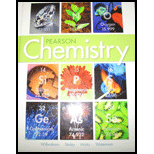
Interpretation : The number of protons for the given element is to be calculated.
Concept Introduction : The positively charged subatomic particles known as protons were first found in the nucleus by Eugen Goldstein.
Answer to Problem 17SP
The number of protons in the element of
Explanation of Solution
Given information:
The atomic number of sulphur is 16.
The positively charged subatomic particles known as protons were first found in the nucleus by Eugen Goldstein.
The count of protons in the nucleus of an element's atom is known as the element's atomic number. An element is identified by its atomic number.
As the atomic number of sulphur is 16, the neutral sulphur atom has 16 protons.
Interpretation : The number of electrons for the given element is to be calculated.
Concept Introduction : Electrons are negatively charged subatomic particles that revolve around the nucleus discovered by J. J. Thomson.
Answer to Problem 17SP
The number of electrons in the element of atomic number 16 is 16.
Explanation of Solution
Given information :
The atomic number of sulphur is 16.
Electrons are negatively charged subatomic particles that revolve around the nucleus discovered by J. J. Thomson.
The atomic number of an element is equal to the number of electrons that revolve around the nucleus.
As the atomic number of sulphur is 16, the number of electrons is also 16.
Interpretation : The atomic number for the given element is to be calculated.
Concept Introduction : The count of protons in the nucleus of an element's atom is known as the element's atomic number. An element is identified by its atomic number.
Answer to Problem 17SP
The atomic number for the element is 23.
Explanation of Solution
Given information :
The number of protons is 23.
The count of protons in the nucleus of an element's atom is known as the element's atomic number.
An element is identified by its atomic number.
As the number of protons is 23, the atomic number will also be 23.
Interpretation : The number of electrons for the given element is to be calculated.
Concept Introduction : Electrons are negatively charged subatomic particles that revolve around the nucleus discovered by J. J. Thomson.
Answer to Problem 17SP
The number of electrons for the element is 23.
Explanation of Solution
Given information :
The number of protons is 23.
Electrons are negatively charged subatomic particles that revolve around the nucleus discovered by J. J. Thomson.
The number of protons is equal to the number of electrons for a particular element.
Since the count of protons is 23, the number of electrons is also 23.
Interpretation : The given element is to be calculated.
Concept Introduction : The count of protons in the nucleus of an element's atom is known as the element's atomic number.
Answer to Problem 17SP
The element with atomic number 5 is boron and its symbol is B.
Explanation of Solution
Given information :
The number of electrons is 5.
The count of protons in the nucleus of an element's atom is known as the element's atomic number.
The number of electrons is equal to the element’s atomic number.
The element with atomic number 5 is Boron. The symbol of boron is B.
Interpretation : The atomic number for the given element is to be calculated.
Concept Introduction : The count of protons in the nucleus of an element's atom is known as the element's atomic number.
Answer to Problem 17SP
The atomic number of the element is 5.
Explanation of Solution
Given information :
The number of electrons is 5.
The number of protons in the nucleus of an element's atom is known as the element's atomic number.
The number of electrons is equal to the element’s atomic number.
So, the atomic number of the element is 5.
Interpretation : The number of protons for the given element is to be calculated.
Concept Introduction : The positively charged subatomic particles known as protons were first found in the nucleus by Eugen Goldstein.
Answer to Problem 17SP
The number of protons of the element is 5.
Explanation of Solution
Given information :
The number of electrons is 5.
The positively charged subatomic particles known as protons were first found in the nucleus by Eugen Goldstein.
The number of protons is equal to the number of electrons for a particular element.
Since the count of electrons is 5, the number of protons is also 5.
Chapter 4 Solutions
Chemistry 2012 Student Edition (hard Cover) Grade 11
 ChemistryChemistryISBN:9781305957404Author:Steven S. Zumdahl, Susan A. Zumdahl, Donald J. DeCostePublisher:Cengage Learning
ChemistryChemistryISBN:9781305957404Author:Steven S. Zumdahl, Susan A. Zumdahl, Donald J. DeCostePublisher:Cengage Learning ChemistryChemistryISBN:9781259911156Author:Raymond Chang Dr., Jason Overby ProfessorPublisher:McGraw-Hill Education
ChemistryChemistryISBN:9781259911156Author:Raymond Chang Dr., Jason Overby ProfessorPublisher:McGraw-Hill Education Principles of Instrumental AnalysisChemistryISBN:9781305577213Author:Douglas A. Skoog, F. James Holler, Stanley R. CrouchPublisher:Cengage Learning
Principles of Instrumental AnalysisChemistryISBN:9781305577213Author:Douglas A. Skoog, F. James Holler, Stanley R. CrouchPublisher:Cengage Learning Organic ChemistryChemistryISBN:9780078021558Author:Janice Gorzynski Smith Dr.Publisher:McGraw-Hill Education
Organic ChemistryChemistryISBN:9780078021558Author:Janice Gorzynski Smith Dr.Publisher:McGraw-Hill Education Chemistry: Principles and ReactionsChemistryISBN:9781305079373Author:William L. Masterton, Cecile N. HurleyPublisher:Cengage Learning
Chemistry: Principles and ReactionsChemistryISBN:9781305079373Author:William L. Masterton, Cecile N. HurleyPublisher:Cengage Learning Elementary Principles of Chemical Processes, Bind...ChemistryISBN:9781118431221Author:Richard M. Felder, Ronald W. Rousseau, Lisa G. BullardPublisher:WILEY
Elementary Principles of Chemical Processes, Bind...ChemistryISBN:9781118431221Author:Richard M. Felder, Ronald W. Rousseau, Lisa G. BullardPublisher:WILEY





